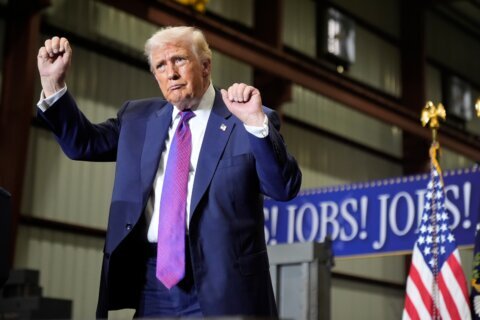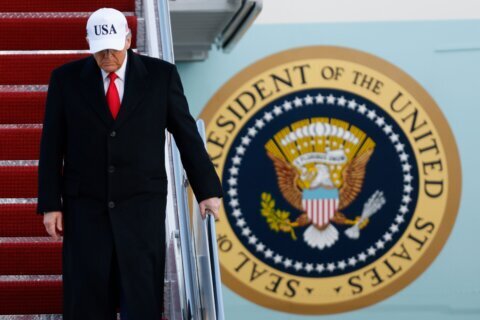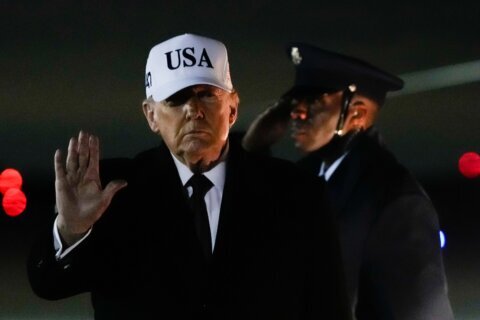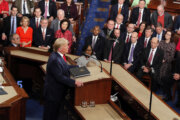NEW YORK (AP) — In February 2017, weeks into the Trump administration, the National Endowment for the Humanities was reviewing a list of nominees for the National Humanities Medals, one of the top honors for creative and scholarly achievement. The plan, as in previous years, was to submit names to the White House and await final approval.
But the NEH chairman at the time, William D. Adams, seemed skeptical.
“Interesting to contemplate where the medals might go,” he wrote to Larry Myers, director of the NEH Office of Planning and Budget, in an email obtained by The Associated Press through the Freedom of Information Act.
“Perhaps nowhere. They can’t seem to get out of their own way there on Pennsylvania Avenue.”
Responded Myers: “Agreed. No one knows which end is up (or down) at 1600 Penn. Ave.”
Nearly a year and a half later, the fate of the Humanities medals — and many others — remains uncertain.
White House ceremonies for arts and science medal winners, a tradition dating back to the 1980s, have been absent so far in the Trump administration. Eighteen months into Trump’s presidency, there have been no new National Science or Technology Medals, or National Medals of Arts or National Humanities Medals.
The honors are personally bestowed by the president and formally approved by the White House, which sometimes adds its own nominees.
President Donald Trump also has yet to announce any Presidential Medal of Freedom awards, the country’s highest civilian honor.
He has awarded several medals for military service and law enforcement, including the Medal of Honor to Vietnam War veteran James C. McCloughan and the Medal of Valor to six responders to the 2015 San Bernardino, California, workplace shooting.
Past recipients of arts and science medals have ranged from Wynton Marsalis to Milton Friedman. But no new science or technology winners have been announced since December 2015, and no arts or humanities winners since September 2016.
The last Presidential Medal of Freedom was given in the final days of Barack Obama’s administration, when Obama presented one to Vice President Joe Biden in January 2017.
The East Wing of the White House is in charge of the medals ceremonies. Stephanie Grisham, director of communications for first lady Melania Trump, said that the administration expected a Medal of Freedom announcement “soon” and planned to give out arts, science and humanities medals in the fall.
She did not have immediate comment on whether the president would give out any awards himself.
With Trump widely disliked in the arts and science communities, the White House may well have reason to avoid related awards ceremonies or at least not have the president on hand. When the Kennedy Center winners were announced last year, Norman Lear was among the honorees who only agreed to turn up for the tribute after Trump decided not to attend.
This year’s Kennedy Center honorees include Reba McEntire and fiery Trump critic Cher; another Trump critic, Lin-Manuel Miranda, will see his “Hamilton” honored with a special award. The White House said it’s too early to know whether Trump will attend the event.
Author Dave Eggers said he could imagine accepting an award during the Trump administration, only if “there was absolutely no connection to the White House and we just acknowledge the work of the NEA and NEH.”
Still, he added, “Anybody would want to read the fine print.”
Spokeswoman Elizabeth Auclair of the National Endowment for the Arts, which recommends arts medals winners to the White House, noted that gaps have occurred when administrations change. The first arts medals under Obama were announced in January 2010, roughly a year into his presidency. The delay under Trump already is six months longer.
Mary Anne Carter, acting chair of the NEA, said in a statement: “The selection of recipients for the National Medal of Arts is, and always has been, a confidential process. And we won’t speculate on when the White House will make an announcement of the next medals ceremony.”
She also noted that the Trump administration did recently announce four new nominees for the National Council on the Arts, which puts together recommendations for arts medals winners.
Spokeswoman Paula Wasley of the National Endowment for the Humanities said that the “NEH is working with the White House on recommendations for the National Humanities Medals.”
The NEH medals, recommended by the National Council on the Humanities and approved by the NEH chair before being sent to the White House, are usually presented at the same time as the arts medals.
Allison Courtin, communications manager for the National Science & Technology Medals Foundation, said that Medal of Science nominees for each of the past three years have been submitted to the White House.
“Very often, two years will be announced and awarded at once,” Courtin said. “If nothing happens before October, we will then have a group of four years that have been nominated and reviewed by the committees but not named as medalists by the White House.”
Medal of Technology nominees for that time are still being reviewed by the foundation, Courtin said.
The arts, humanities and science organizations have continued with other programs and awards, such as the NEA’s Jazz Masters honors and the NEH’s student scholar competition, despite personnel changes and budgetary fights.
The Trump administration proposed eliminating the NEA and NEH each of the past two years, but funding was restored by Congress. Carter is filling in at the NEA after chair Jane Chu stepped down earlier this year. In May, John Parrish Peede was sworn in as chair of the NEH, replacing Adams, an Obama appointee.
The NEH has clearly been working on getting medals winners approved. Emails show that soon after Trump’s election in November 2016, the NEH was preparing a list of nominees for the White House.
In December 2016, Myers sent an organization-wide email calling for nominations and noting that the deadline was Jan. 16, 2017. On Jan. 18, 2017, Myers emailed NEH senior program analyst Frank Shaw, forwarding a proposed (and redacted) list of 10 nominees. Biographies of the proposed nominees were being written in February 2017 and council members were being asked to submit recommendations for a straw poll “even if this exercise seems far-fetched during these perilous times,” Myers wrote to Adams and others.
But, by the spring, NEH officials were expressing doubts the medals would be approved.
Timothy B. Aiken, the NEH’s Director of Congressional Affairs, was asking if the process had been “officially suspended’ for the year. A September 2017 email from Carter shows that the endowment was still hoping to send a list of recommendations to the White House. A Sept. 25 email from Peede mentions the “NEA side” of the nominees, indicating that arts medals winners also were being proposed to the White House.
In March 2018, Peede emailed council members with an update on the medals. Acknowledging that the process had been “poorly handled” by the NEH the year before, Peede wrote that the 2017 list had been resubmitted to the White House, with some additional nominees included.
“At this time, the White House has not confirmed a date for the medal ceremony,” he wrote.
___
Associated Press Writer Darlene Superville in Washington contributed to this report.
Copyright © 2026 The Associated Press. All rights reserved. This material may not be published, broadcast, written or redistributed.







